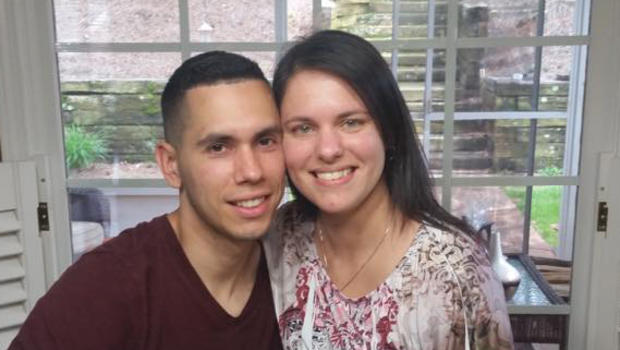Georgia mom battles rare flesh-eating bacteria
An Atlanta-area woman is fighting for her life against a rare and serious infection, and no one knows how she got it.
Cindy Martinez, a former Marine and a mother of two, contracted a case of flesh-eating bacteria called necrotizing fasciitis. Doctors say there's a possibility they may have to amputate her arms or legs.
"This has made me realize that you truly don't know what's in store for you every day in life," her husband, David Martinez, told CBS Atlanta station WGCL.
"She's in a lot of pain. She has no appetite. She's just exhausted, and I mean, it's an up and down roller coaster at this point," he said. "She thought she was going to come home in a few days and I knew having a conversation with her that it wasn't [going to be] the case."
Cindy Martinez went to the emergency room May 25 with severe pain in her shoulder, and by the next day, doctors determined that her body was shutting down and the only way to save her was with emergency surgery. It was clear to David Martinez that his wife's hospital stay was not going to be a short one.
"I had to tell her the truth, and tell her she's not coming home. I don't know when. I couple of weeks, a couple of months. I don't know," he said.
Doctors say the bacteria that causes this devastating infection is naturally present all around us and usually poses no threat, but it can become flesh-eating under the right set of unusual circumstances. If someone has a break in their skin and they come into contact with something unsanitary, such as stagnant water, it increases the chances that bacteria will turn virulent.
Exactly where Cindy Martinez picked up the bacteria may never be known. "It's even more rare, from my understanding, for people who are healthy like my wife," her husband said.
Friends and family are praying for her recovery from the rare condition that is attacking her body. Despite the severity of the illness, some other survivors show it is possible to pull through.
Aimee Copeland was struck by the bacteria three years ago when she cut her leg while ziplining and swimming in a Georgia creek. She spent weeks on life support and doctors had to amputate both of her hands and legs. But she has persevered and learned many ways to adjust to the challenges of her new life.
"I've found adaptations, ways to do my hair, put my hair in a ponytail, ways to cook, chop food in the kitchen," she told WGCL reporter Melinda Roeder.
She still remembers vividly what she went through in the hospital. "I was removed from all the painkillers I was on and the reality of the situation that these are not growing back - you're gonna have to figure out life in this body - really sunk in. And that was a really difficult time for me," she said.
Copeland now works with other amputees and plans to write a book about her experiences. She has been in touch with the Martinez family to offer support.
David Martinez doesn't know if there is anything they could have done differently to catch his wife's infection quicker, but he urged others to be aware of the risk. "You know your family and your friends better than anyone else. If you see something is out of the ordinary, or not their normal self, then yes, definitely go get it checked out. Of course."
The entire ordeal has been very difficult for the Martinez family, and a Go Fund Me account has been set up to help with their medical expenses and bills.

